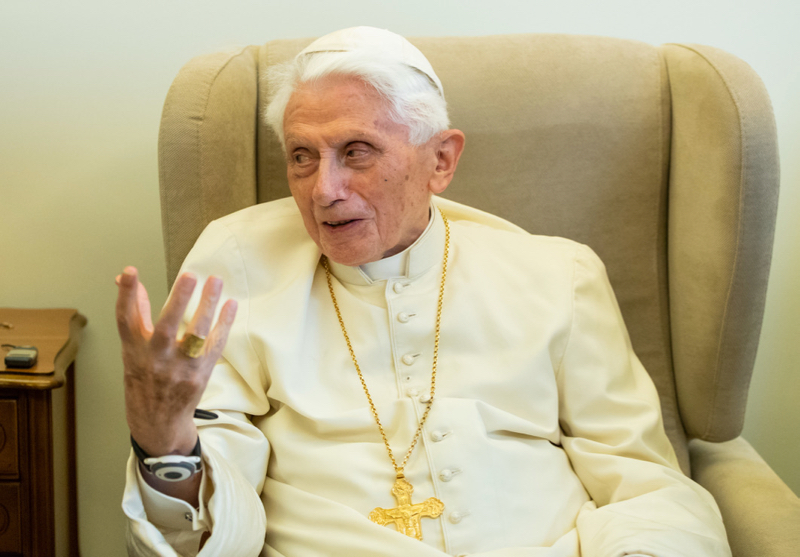Benedict XVI has reprimanded a German cardinal for criticising his decision to step down, arguing that “anger” about his resignation has devalued his papacy, and is being “melted into the sorrow” about the Church’s problems.
The Pope Emeritus made the remarks in recent letters to Cardinal Walter Brandmüller, one of the “dubia” cardinals who has publicly challenged Pope Francis over his family life teaching.
At one level, the letters can be read as a rebuke to Pope Francis’ critics, many of whom felt betrayed and angered by Benedict XVI’s decision to resign and have seen the Pope Emeritus as a rallying point for Francis resistance.
On the other hand, critics of this Pope are likely to seize on Benedict XVI's use of the word “sorrow” about the Church’s situation as a sign that Francis’ pontificate is going in the wrong direction.
The overriding concern from Benedict appears to be that his papacy is being devalued by those using it as a political weapon to undermine Francis.
In the correspondence, obtained by German Newspaper “Bild,” the 89-year-old cardinal complained to Benedict that his decision to step down precipitated a crisis in the Church and caused serious harm.
But the Pope Emeritus gives him a sharp reply.
“I can very well understand the deep-seated pain that the end of my papacy has inflicted on you and many others. However, for some people and – it seems to me – also for you, the pain has turned into an anger that no longer merely concerns my resignation, but increasingly also my person and my papacy as a whole,” Benedict writes.
“By this, a papacy itself is now being devalued and melted into the sorrow about the situation in which the Church currently finds itself.”
He goes on: “If you know a better way [i.e. resignation] and therefore think that you can judge the one chosen by me, please tell me.”
Following his dramatic 2013 decision to resign, Benedict XVI promised to remain “hidden to the world” although he has been publicly embraced by Francis who describes his presence in the Vatican as like having a “wise grandfather living at home”.
But many of the Pope Emeritus’ supporters saw him as the standard bearer of orthodoxy and a restorationist movement in Catholicism which the Latin American Pontiff has undermined with his vision of a less doctrinally rigid and more missionary Church serving the poor and marginalised.
Divisions between Benedict and Francis are also at the centre of Archbishop Carlo Maria Viganò’s explosive allegations against this Pope concerning Archbishop McCarrick’s sexual misconduct with seminarians. In an 11-page testimony released last month, Archbishop Viganò called on Francis to resign for allegedly lifting sanctions against McCarrick imposed by Benedict XVI.
Archbishop Viganò, who has yet to produce documentary evidence to back up his claims, was present with Cardinal Brandmüller during a conference in Rome in April where the keynote speaker, US Cardinal Raymond Burke, spoke about the limits of papal power.
Cardinals Burke and Brandmüller are among four prelates – two of whom have died – who set out a series of questions, known as “dubia,” to Francis over his family life document “Amoris Laetitia”. Cardinal Burke has said that if the “dubia” are not answered then he could make a public correction of the pontiff.
In 2016 Cardinal Brandmüller presented the case against Benedict XVI’s resignation, including his decision to take the title “Pope Emeritus”, something he believed risk causing divisions.
The cardinal, the former President of the Pontifical Committee for Historical Sciences from 1998 to 2009, describes as “necessary and urgent” new “legislation that would define and regulate” the status of a former Pope.
Those opposed to Benedict XVI’s decision have argued that resigning the papacy de-sacralises, or de-mystifies, the office of the Successor of St Peter.



 Loading ...
Loading ...